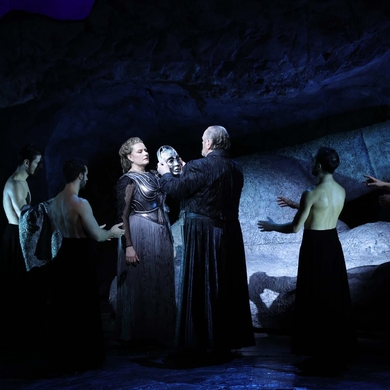Based on a play by Alexander Pushkin, Modest Mussorgsky’s great fresco of medieval Russia exists in two distinct versions. The original Boris Godunov, of 1868, concentrates on the figure of the failing tsar, once the right hand to Ivan the Terrible, then implicated in the murder of his 10-year-old heir Dmitri, now unstrung by an uprising led by an impostor claiming to be the undead tsarevich. Though today, many prefer the opera in that form, persuasive contemporaries of Mussorgsky’s insisted he inject some properly operatic love interest. Going back to Pushkin, Mussorgsky restored the previously omitted “Polish act” of 1872, which finds the false Dmitri in the clutches of the Polish aristocrat Marina Mnishek, whose heart is set on the Russian throne. She, though, is an asset of the wily Jesuit Rangoni, an agent of Rome. The ballroom splendors and romantic machinations are brilliantly conceived and can land to great effect. If it doesn’t, we’re talking an hour-long detour smack in the middle of what is now a very long evening. In the new Amsterdam production, with the Circean American mezzo Raehann Bryce-Davis, there’s every reason to expect we’ll perk up in Marina’s presence and miss her when her single act is over. Sharing her moment are the Armenian baritone as the scaly Rangoni and the Uzbek tenor Najmiddin Mavlyanov as the false Dmitri, who’s prepared to abandon his campaign for some June/moon with Marina, which isn’t what she’s after at all. With that out of the way, it’s back to Moscow for soul-shattering scenery chewing by the brooding Polish bass-baritone Tomasz Konieczny’s Boris. And the Ukrainian-born bass Vitalij Kowaljow is on hand as the historian-monk and former warrior Pimen to tell of a miraculous manifestation of the murdered Tsarevich—the last straw for Boris but for some of us, the ray of revelation that pierces the heart. The new production is by the very busy Russian director-designer Kirill Serebrennikov, a phenomenal craftsman whether one buys his ideas or not. The conductor is Vassily Petrenko, the Russian-British music director of London’s Royal Philharmonic—no kin to the Russian-Austrian Kirill Petrenko, who holds that position with the Berlin Philharmonic. —Matthew Gurewitsch
Arts Intel Report
Boris Godunov by Modest Mussorgsky

Design and imagery for Boris Godunov.
When
June 10–29, 2025
Where
Etc
Photo: © Dutch National Opera



